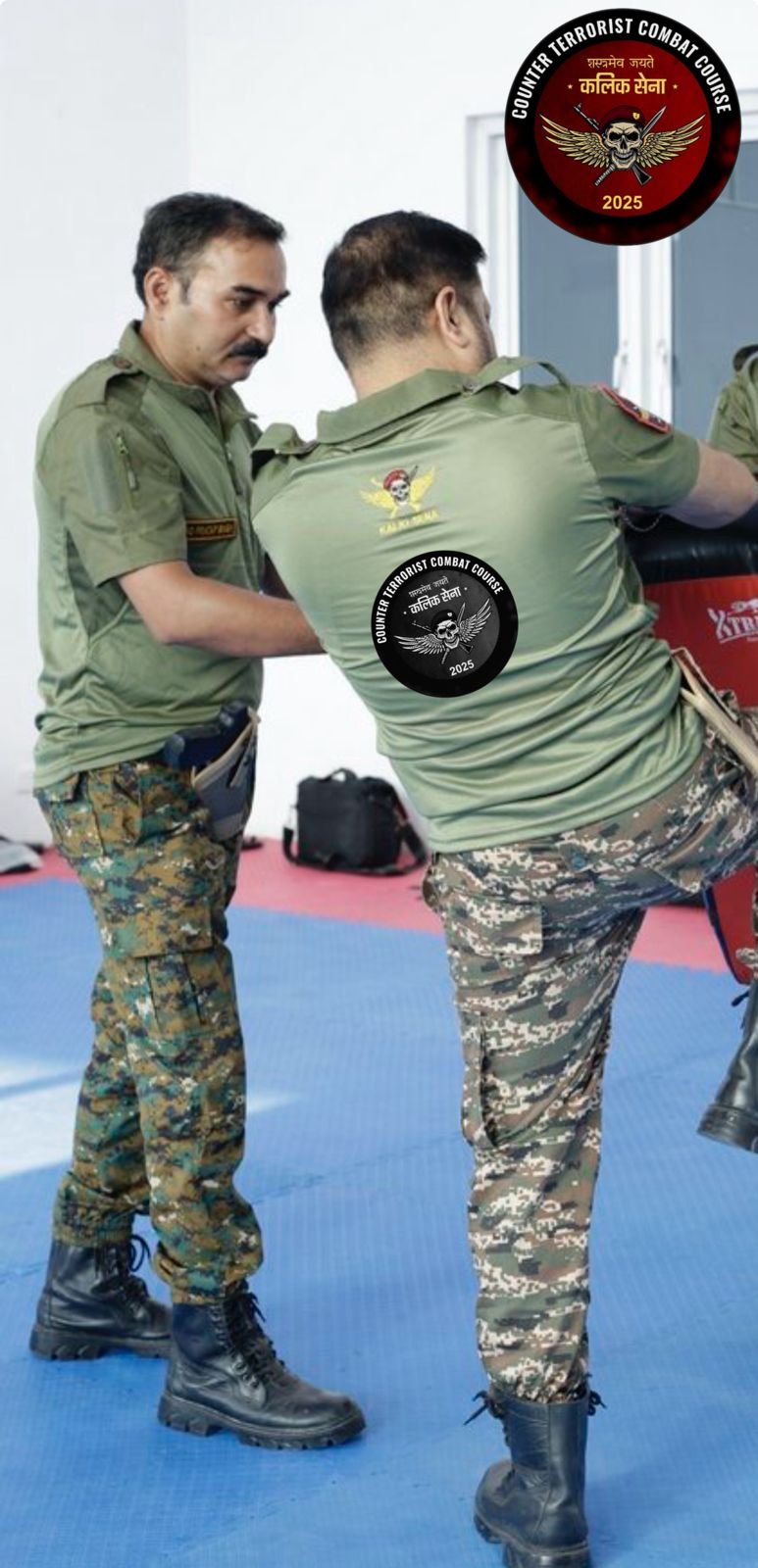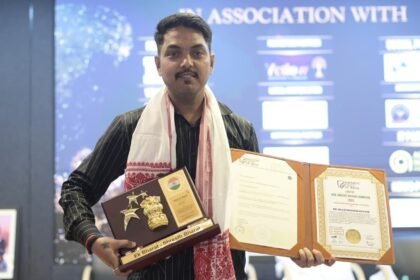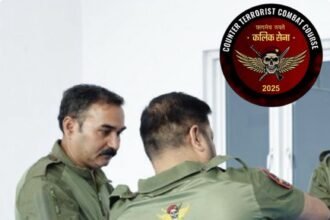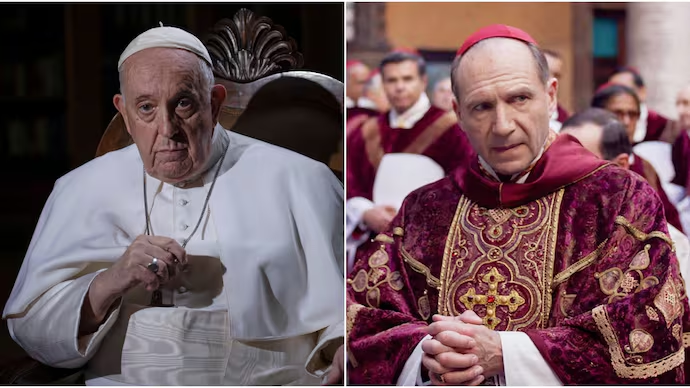The graduation of Kalki Sena’s Counter Terrorist Combat Course 2025 at the Advanced Combat Training Centre, Noida, was not merely a military-styled ceremony — it was a statement on Bharat’s evolving education in civic discipline and dharmic responsibility. Under the supervision of the Sena’s Northern Command, the event marked the completion of a rigorous, multi-dimensional training initiative that unites ancient wisdom with modern tactical learning.
At its heart lies a simple conviction: National defence begins with the education of the citizen.
From Knowledge to Capability
In his keynote address, Wing Commander (Dr.) Pushkal Vijay Dwivedi (Retd.), Chief of Kalki Sena and a respected education reformer, underscored the deeper vision behind the movement.
“Kalki Sena is committed for upliftment and empowerment of Hindus in all four dimensions — physical, mental, economic and social. We are preparing warriors for the protection of Hindu temples, population and the sovereignty of Bharat. This movement is rooted in our Vaidik concept of Shakti — where empowerment is a sacred duty, not a slogan.”
Dwivedi explained that the Sena’s structure mirrors an educational institution more than an activist group. Each training batch progresses through academic-like modules — starting from foundational awareness to advanced physical, psychological, and ethical readiness. The approach synthesises Rashtriya Suraksha (National Security) with Rashtriya Punarnirman (National Reconstruction), producing citizens who are aware, confident, and community-minded.
Curriculum of Strength and Awareness
The Counter Terrorist Combat Course 2025 included an array of practical and cognitive subjects — urban warfare, close-quarter battle, self-defence, surveillance, weapon handling, survival psychology, and rescue operations. These disciplines were not taught as instruments of aggression but as extensions of wisdom, caution, and mental control.
Anand Pratap Singh, Public Relations Officer to the Chief, briefed the media that “the course is designed with escalating intensity, ensuring participants match the alertness and reflex of elite forces.” The intention, he said, is to integrate the logic of the classroom with the reflex of the commando.
Commando Instructor Varun Rawat, Director (Operations Training) Northern Command, elaborated:
“We are training Kalki warriors from Level One to Level Four on standards parallel to special forces and police commandos. The purpose is to create a disciplined and self-reliant citizen base that can assist the nation in crisis while remaining lawful and rooted in moral conduct.”
Each level concludes with evaluation drills where participants are assessed not only for physical capability but also for teamwork, crisis psychology, and leadership — making the course as much about character as combat.
The Educator Behind the Movement
At the centre of this initiative stands Wing Commander Pushkal Dwivedi — a name increasingly synonymous with the educational revival of Bharat. His dual identity as a defence technologist and educationist has shaped his leadership across multiple sectors.
As Director-General of the Bhartiya Shiksha Anusandhan Parishad (BSAP), Dwivedi has introduced Self-Defence Science as an academic discipline now adopted by the Bhartiya Shiksha Board (BSB) — India’s first national education board for indigenous knowledge systems. The subject blends combat psychology, civic ethics, law, and physical conditioning into a single framework, ensuring that the next generation grows up mentally resilient and physically confident.
His personal journey — spanning Lucknow University, IIM Ahmedabad, ISB Hyderabad, MICA Ahmedabad, IIT Mumbai, and the University of California — reflects a rare combination of Eastern value-based learning and Western technical mastery.
A doctoral researcher in Quantum Weapons, Dwivedi’s research merges the strategic ethos of the Mahabharata with future-ready technology, redefining Atmanirbhar Bharat as not only economic self-reliance but also intellectual sovereignty.
Recognised Globally, Rooted in Culture
The London Book of Records recently acknowledged Kalki Sena as the world’s largest civilian combatant volunteer organisation — a recognition that underlines how a culturally rooted initiative can gain international relevance without losing its essence.
The Sena’s model of lawful civic empowerment has inspired multiple educational and security institutions to explore similar frameworks for youth training. Its philosophy resonates particularly in rural Bharat, where moral education and physical training are often viewed as separate pursuits. Kalki Sena’s work reunites them.
Prior to the Pahalgam terror attack, Dwivedi and his core team presented a detailed counter-terror and community-defence proposal to Defence Minister Rajnath Singh, calling for structured civil participation in crisis response. The proposal’s central idea — that trained, ethical citizens can be the backbone of resilience — is increasingly finding policy acceptance.
Discipline, Not Demonstration
In his statement, Adjutant General Gaurav Pandey defined the Sena’s character with precision:
“Kalki Sena is not like other organisations. We don’t do dharna, candle march, or gherao. We are focused on creating a powerful Hindu diaspora worldwide which itself is a power group and a deterrence — and at the same time provides full support to the Government of India to protect the motherland.”
This statement captures the Sena’s difference — not an organisation of protests, but of preparation; not driven by outrage, but by order.
The presence of Dr. Siddhartha Bhattacharya and Mr. Alok Kumar at the ceremony, both senior board members and educationists, reaffirmed the intellectual seriousness of the movement.
Education as National Security
As the 2025 batch graduated with ceremonial salutes and received their insignia, the message was unmistakable — Kalki Sena is redefining education itself as a form of national defence.
It treats the classroom and the training ground as two sides of the same coin. In doing so, it brings the civilisational spirit of Sanatan Dharma — where Shakti (strength) and Buddhi (wisdom) coexist — into the modern framework of citizenship.
With the 2025 graduates standing ready as disciplined, law-abiding, and skilled patriots, the Sena reaffirms an ancient truth: that true empowerment is not rebellion but responsibility, and that Bharat’s future will belong to those who are both learned and prepared.











